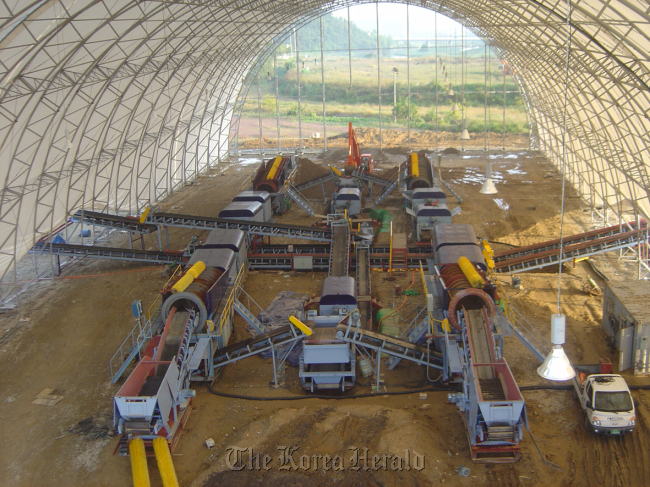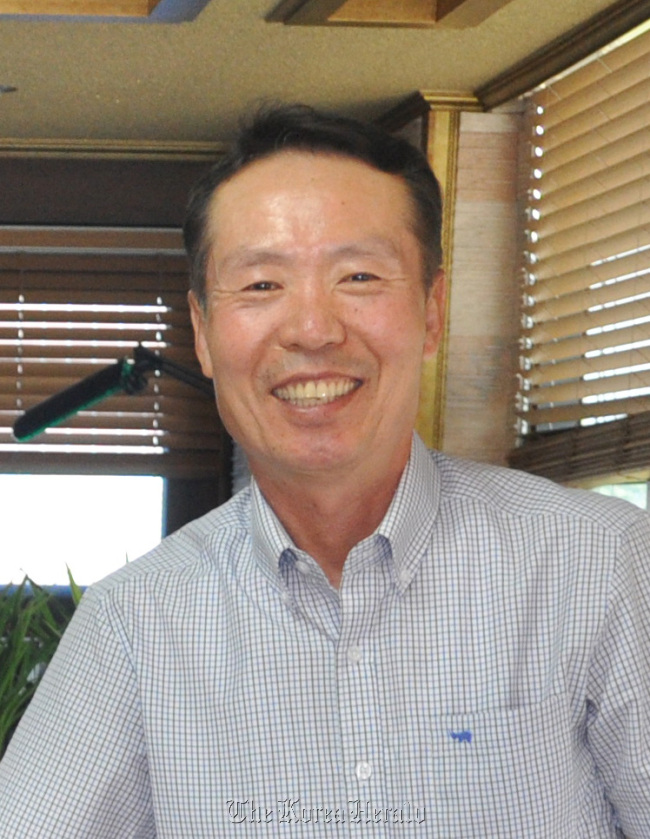Venture firm innovates landfill
Forcebel offers solutions to urban waste problems through landfill mining
By Korea HeraldPublished : Nov. 15, 2012 - 19:21

The Korea Herald, in collaboration with the Korea Environmental Industry & Technology Institute, is presenting a series of articles introducing small but promising environmental tech firms. This is the tenth and last installment. ― Ed.
Landfilling has been the most common method of urban waste disposal. But it has become a major source of headache as cities are running out of new land for dumping and public awareness is growing of its potential environmental hazards.
The problem is acute especially in Korea, where cities are highly congested and land prices are high.
Forcebel Co., a Hwaseong-based firm specializing in waste treatment, suggests that the country take a new approach: Landfills are an untapped pool of resources, so hire a landfill miner to harvest the valuables that are buried underneath.
“Waste is money for us,” said Na Kyung-duk, CEO of Forcebel.
Landfilling has been the most common method of urban waste disposal. But it has become a major source of headache as cities are running out of new land for dumping and public awareness is growing of its potential environmental hazards.
The problem is acute especially in Korea, where cities are highly congested and land prices are high.
Forcebel Co., a Hwaseong-based firm specializing in waste treatment, suggests that the country take a new approach: Landfills are an untapped pool of resources, so hire a landfill miner to harvest the valuables that are buried underneath.
“Waste is money for us,” said Na Kyung-duk, CEO of Forcebel.

His company excavates and recovers reusable metals in landfill waste, such as scrap steel and aluminum and turns combustibles into boiler fuels. After its multi-stage sorting process, the volume of refuse that needs to be buried again is reduced significantly.
“The latest trend is to opt for ‘sustainable landfills’ or reuse closed dump sites,” he said. “It creates more opportunities for landfill mining.”
A sustainable landfill envisions a landfill that cleans itself of all harmful substances with the help of various bioremediation technologies. Squeezed by growing waste problems, many local governments in Korea are currently studying ― some are already investing in ― the concept. Landfill mining or reclamation is a process whereby solid wastes which have previously been landfilled are excavated and processed. Through such a process, a closed dump site is remade into residential and industrial space or re-used as a landfill.
“As cities expand, landfills that were initially located in the suburbs become integrated into the cities. We have conducted scores of projects to clear such dump sites for construction of apartment buildings, sport facilities and parks,” Na said.
What makes Forcebel stand out in landfill management is its unique sorting technology, the CEO said, who set up the firm in 2000.
While most waste sorting facilities currently available in the market use wind to separate light and heavy materials, Forcebel uses mechanical methods to sort reusable metals such as aluminum and steel; bio-treatable garbage such as food, wood and paper; and others that can be turned into combustion fuels.
It greatly improves recovery rates and as a result reduces the volume of waste for burial.
“Korea may lag behind advanced countries in most areas of green technologies and industries, but in the field of landfill reclamation, we’re at least a few steps ahead of them,” Na said.
As a country with scarce natural resources, a dense population and rapidly-achieved urbanization, Korea had a more serious landfill problem. These factors combined made the country, and Forcebel, an early mover in waste sorting technologies and landfill reuse, he added.
The firm is now aggressively expanding overseas to secure further growth.
“Landfill problems are almost universal, although the levels of urgency differ,” he said. “I believe that our future growth is in global markets.”
Priority markets are China, Southeast Asian countries and Brazil, where problems are more severe, he added.
Another major market for Forcebel is neighboring Japan. It has been selling through a local arm since 2006. Recently, it has built three waste sorting plants in Iwate Prefecture, which is struggling to clean up hills of debris from the catastrophic earthquake and tsunami in March 2011.
“Three more will be installed soon,” Na said.
Forcebel reported 20 billion won in sales last year, with 3 billion won of the total coming from foreign markets. In the next few years, Na aims to hike the share of overseas sales to 50 percent of its total sales.
By Lee Sun-young (milaya@heraldcorp.com)
-
Articles by Korea Herald


















![[KH Explains] Hyundai's full hybrid edge to pay off amid slow transition to pure EVs](http://res.heraldm.com/phpwas/restmb_idxmake.php?idx=652&simg=/content/image/2024/04/18/20240418050645_0.jpg&u=20240418181020)

![[Today’s K-pop] Zico drops snippet of collaboration with Jennie](http://res.heraldm.com/phpwas/restmb_idxmake.php?idx=642&simg=/content/image/2024/04/18/20240418050702_0.jpg&u=)